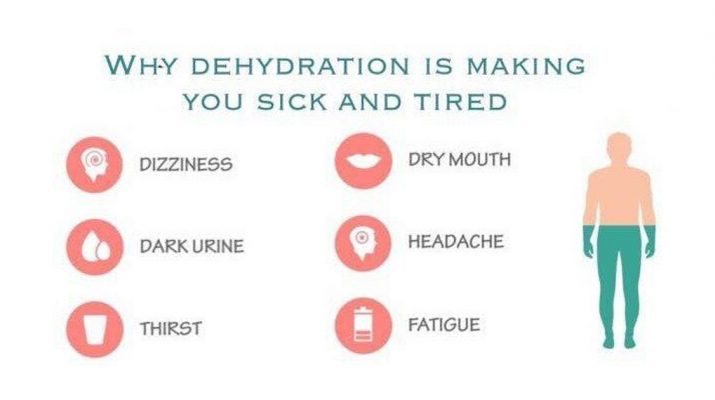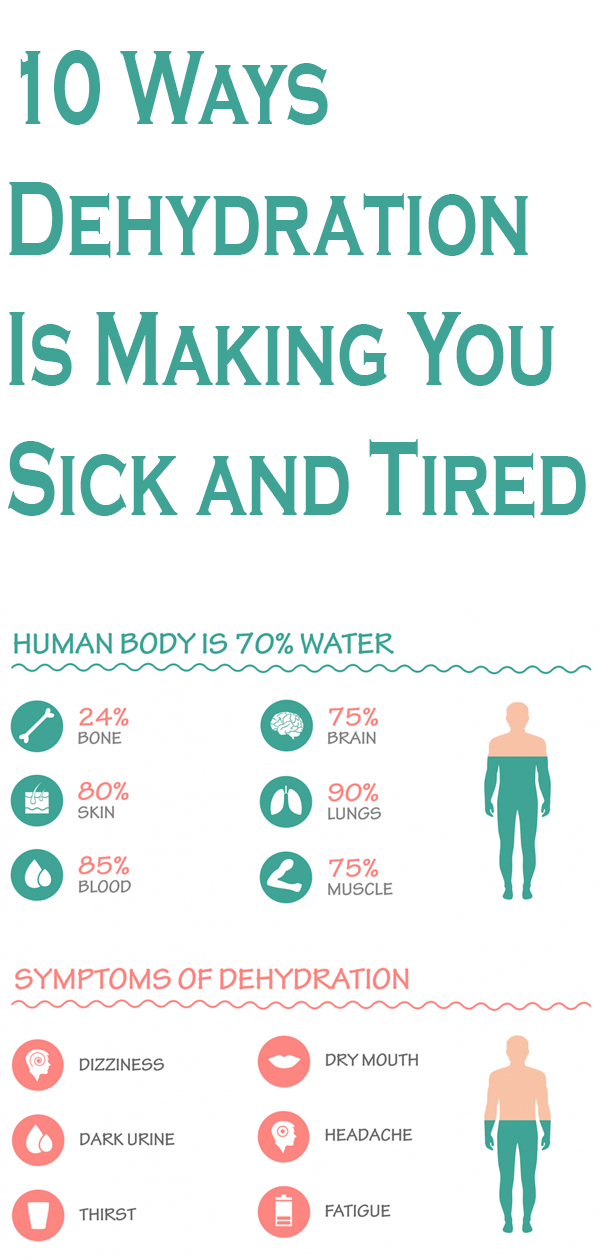Did You Know Not Drinking Enough Water Can Actually Make You Sick?
Experts say that people don’t need to necessarily drink eight glasses of water per day, but at least half an ounce to an ounce for each pound you weigh, according to an article on WebMD. However, exercise and the climate where you live also come into play when calculating how much water you need to drink per day.
If you live in a very hot climate and exercise outdoors frequently, you’d need more than the recommended amount. If you live in a cooler climate and are mostly sedentary, your water intake would fall on the lower end of the range.
When it comes to water, unfortunately, a shocking 75% of Americans suffer from chronic dehydration, according to a report by CBS.
Seeing as approximately 60% of our bodies, 75% of our muscles, and 85% of our brains are composed of water, dehydration should not be taken lightly. Dehydration can affect many different functions and parts of the body, leaving you feeling lethargic, sick, and simply exhausted.
Here Are 10 Specific Ways That Dehydration Can Negatively Impact Your Health:
1. Chronic Fatigue
As you might already know, our bodies require regular consumption of water in order to function properly. If we don’t drink enough water for our body’s needs each day, our entire system begins to slow down, as the body runs off of its reserves of water to maintain bodily functions.
The body thinks it’s in conservation mode, so in turn, it must actually use more energy in order to keep blood pumping to your heart and through your veins. This will cause fatigue to set in pretty quickly, and unfortunately, most people today feel sluggish in part because they don’t drink nearly enough water.
Next time you feel tired, try drinking a glass of water and see how much more alive and alert you feel afterward.
2. Elevated Blood Pressure
Dehydration causes the blood to become thicker, resulting in slower blood flow and a higher sodium content in the blood. All of these factors combined provide the perfect environment and conditions for high blood pressure, which can result in some of the other health problems on this list.
3. High Cholesterol
Being dehydrated means that your body will hold onto any water it can find so more water loss doesn’t occur. In this study, 15 people completed a fast under two different circumstances: once without fluid replacement, and another time with salt and water supplementation.
The researchers found that when the participants fasted with no fluids, their total serum cholesterol levels were much higher than when they were provided with salt and fluid supplementation. While most people don’t fast with no fluids at all, drinking sugary, nutrient-lacking drinks in place of water throughout the day can cause dehydration, and therefore raised cholesterol levels.
4. Digestive Problems
Water gets things moving throughout your entire body, including your digestive system. Water serves as a wonderful way to cleanse and detoxify the body, but without enough water, waste moves through the colon much more slowly, which can lead to constipation or other digestive disorders.
Every time you eat foods, the body must work to break them down and move them through the digestive system. Water greatly aids in this process, but when the body is in a dehydrated state, the large intestine soaks up the water from the foods you eat. This increases the likelihood of constipation, acid reflux, ulcers, and other digestive issues.
5. Skin Flare-Ups
Did you know that dry skin is one of the leading signs of dehydration? Dehydration normally shows up on the outside of our bodies, because water detoxifies and hydrates every part of the body, including the skin. Without adequate water, toxins build up on our skin, resulting in many different skin disorders. Acne, psoriasis, eczema, and discoloration can all occur as a result of dehydration.
6. Bladder/Kidney Infections
This probably comes as no surprise, but when you don’t drink enough water, this creates the perfect environment for harmful bacteria to thrive. In a weakened and dehydrated state, the body simply becomes more prone to all types of infections, including bladder and kidney infections. If you don’t drink enough water, you won’t be eliminating toxins through your urine often enough during the day, which means the bacteria will build up in your system, causing bladder and kidney issues.
7. Weight Gain And Higher Risk For Obesity
If your body is already in a dehydrated state, it can be difficult to discern between hunger and thirst signals. The same part of the brain controls hunger and thirst cues, so when you’re already dehydrated, you will likely opt for food before water, as you believe you’re hungry.
In reality, you should try drinking a glass of water first and see if the signal goes away. Staying properly hydrated can stave off unwanted pounds because it will become easier to tell the difference between hunger and thirst pangs.
8. Increased Risk Of Asthma And Other Allergies
The body naturally produces more histamines as it loses water, and when dehydrated, the lungs become constricted as to conserve adequate water for survival. In order to breathe properly, the lungs must be moist so they can take in oxygen and carry carbon dioxide out of the body. If the body is in a dehydrated state, the lungs become dry and somewhat rough, resulting in difficulty breathing and keeping allergies at bay.
9. Weakened/Stiff Joints And Muscle Cramps
Dehydration causes the joints to become weak and stiff due to a lack of water in the cartilage padding (composed of mostly water). Also, lack of sodium and potassium (found in water) can cause muscle cramping, and coupled with exercise in hot weather, this can point to the early signs of heat stroke. If you’re exercising outside, make sure to bring at least a gallon of water with you, just in case.
10. Headaches And An Otherwise “Foggy” Brain
Dehydration actually causes brain tissue to lose water, resulting in the brain shrinking and pulling away from the skull. In turn, this sends alarms to the pain receptors surrounding the brain, which gives you that nasty midday headache that you wish would just fade away somehow. Also, dehydration decreases blood volume, which means less blood and oxygen will flow to the brain.
The blood vessels in the brain dilate to keep the blood flowing, resulting in inflammation and a pounding headache that many people are unfortunately all too familiar with.
So, how can you keep from getting dehydrated in the first place?
Make sure to bring water with you wherever you go, preferably in a reusable water bottle that you can easily bring to work, school, or on errands. This will ensure you’re drinking enough water, which will ward off all of these symptoms and health problems listed above.


